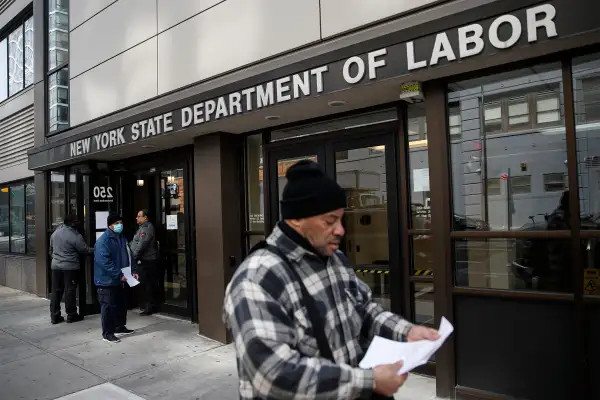Most Job Search Requirements for Unemployment Benefits Are Waived. So Why Do State Websites Say Otherwise?

In March, Michelle Case suddenly found herself out of a job. An esthetician in South Carolina, she filed for unemployment when her employer shut its doors amid concerns about spreading the coronavirus.
Fortunately, her husband Nick learned a change had been made to South Carolina's unemployment insurance program: Michelle was no longer required to look for a job in order to collect her weekly allowance. That was especially welcome news given her line of work — all spas were closed, so it wasn't like she could apply to others to prove she had been job searching. Plus, her employer intended to hire her back when they reopened…whenever that might be.
But when the Cases went to file a claim through their state program on April 24, they ran into a discrepancy in the application instructions, which they accessed through South Carolina's MyBenefits portal — a website run by the Public Employee Benefit Authority.
"The website still listed the need to look for work every two weeks," Nick says. "In keeping up with it, I knew that that was something that had been waived. I did a Google search and it said it had been waived indefinitely."
As the U.S. unemployment rate hit 14.7% in April, a record number of Americans are navigating the unemployment process, many for the first time. According to the normal federal guidelines, unemployment insurance recipients have to provide proof of a job search by logging their activity on forms — like this one, issued by the state of New York. But unsafe working conditions, hiring freezes, and a general lack of networking opportunity caused by the coronavirus has made job hunting a near-impossible task.
“It's a futile exercise to require people to be actively looking for work,” says Maurice Emsellem, the Fair Chance Program Director at the National Employment Law Project. “They don't need all of these extra requirements they require in normal times — these are not normal times.”
Recognizing that, the U.S. Department of Labor issued guidance in March, giving states “significant discretion” to temporarily change or suspend job search requirements. And as of April 30, at least 39 states and Washington D.C. had waived the rule about searching for work to some degree, according to the National Conference of State Legislatures. Of those, a majority of states — including South Carolina — don't have any stipulations on that waiver.
But you wouldn't always know that from looking at the unemployment application forms, as the Cases learned.
Outdated Forms Cause Confusion
“There was some confusion because [the application] said you have to update us on the job hunt every two weeks, and I knew that wasn't the case,” Nick says. “I knew specifically it [didn’t apply] to the state but it was still on the website.”
Per a handbook published by the state on April 17, questions about work search requirements were kept as is on the unemployment web site, in order to cater to residents who are receiving benefits outside of the scope of the coronavirus.
"Because unemployment insurance is a temporary bridge while an individual tries to find other employment, our system provides this question for claimants who started receiving UI benefits prior to COVID-19," it reads. "However, with the changes in state and federal law to assist during COVID-19, you can answer the question honestly [...] if you answer “no” you will not be penalized for not completing a job search."
The application itself is often an interactive form that people fill out by logging into their state's unemployment insurance portal. States might be less inclined to change the language in their forms since the waiver is a temporary emergency measure — states will presumably reinstate the job search requirement when the crisis passes. Plus, the abrupt nature of it all means some states might not have had time to update their forms to reflect the waiver.
“When they're rolling the programs really fast like they are right now, they can't get around to fixing all of these forms,” says Emsellem. For the states that have stipulations on the waiver — a time limit or a condition that the waiver can only be granted to furloughed individuals — this can mean even more language to include. And then there's the added layer of the technical updates.
In Missouri, where the work search requirements have been removed for anyone laid off for eight weeks or less, the unemployment form features a "COVID-19" box, and checking it removes the job search requirement. But back when the change was first made in mid-March, a bug still prompted you to fill that section out.
That bug has since been fixed, with new language to replace the auto-populated screen, according to a spokesperson from the Missouri Department of Labor and Industrial Relations. Anyone who checks the COVID-19 box and files a claim gets the message, "Since you are unemployed due to COVID-19, you are not required to complete work search activities," in red lettering. Anyone attempting to complete the weekly request gets similar advice.
"There was an issue with [Pandemic Unemployment Assistance] claims (which were filed beginning the week of April 19) still showing work search requirements, but we believe all those have been corrected," the spokesperson told Money in an email.
What Applicants Can Do
This confusion over work requirements can add unnecessary stress in states that have waived the need to job search. You don't want to have to worry about whether your failure to look for a job will jeopardize your much-needed unemployment check.
Before you fill out an unemployment form, check a resource like the National Association of State Workforce Agencies, where coronavirus-related information is listed out by state, as provided by the state. If you're confident in what you know about your state's work search policy but the form says otherwise, it could simply be outdated information. At that point, your role is to fill it out to the best of your ability.
“The best advice is to honestly answer the questions. And if there's any discrepancy [...] the state will follow-up and try to clarify if there's an answer that needs clarification,” Emsellem says.
More from Money:
'Once-in-a-Lifetime Deals': Buying a Car During Coronavirus Isn't Easy, But You Could Save Big
The Coronavirus Outbreak Is Highlighting the Importance of Emergency Funds
